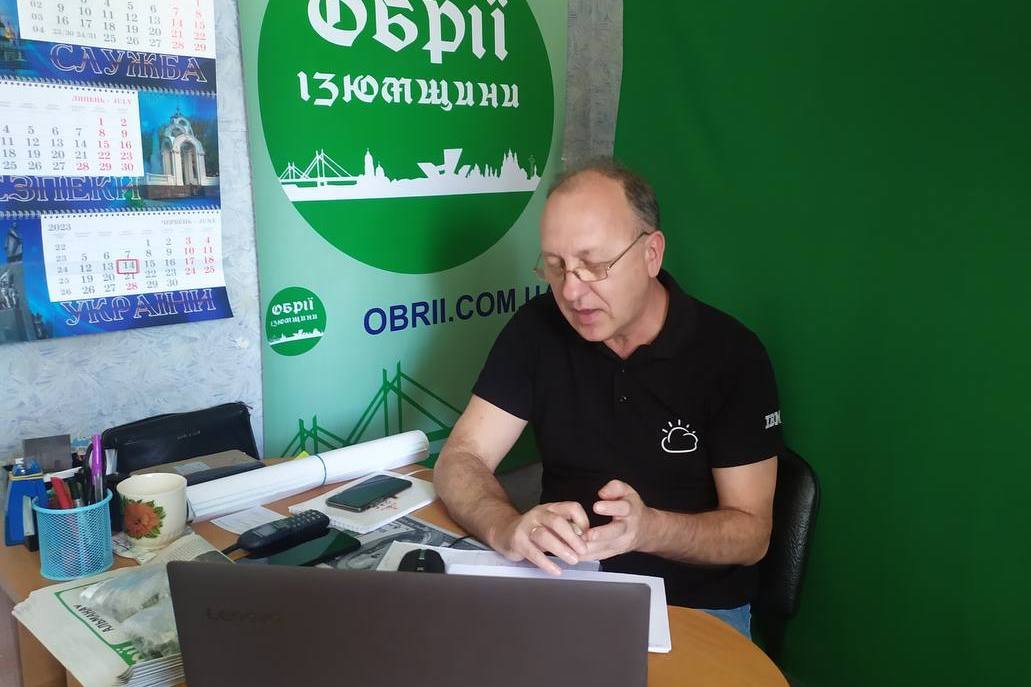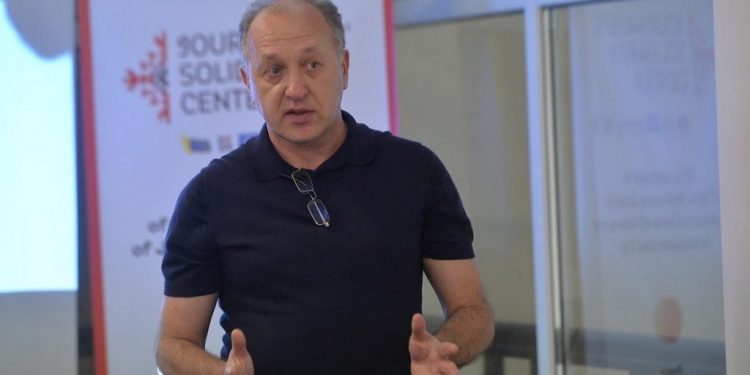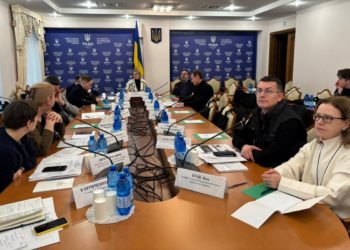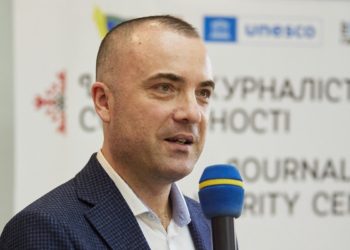“The training did not pass without a trace – that’s for sure!” said Kostiantyn Hryhorenko, the mentor of the National Union of Journalists of Ukraine’s (NUJU) project titled Steps To Sustainable Development. For five months, he worked first with 27 and later, more practically, with 15 selected newsrooms from the front-line and de-occupied territories, helping them learn not only to write journalistic materials but also to earn money for their publications.
The main goal of the project, the NUJU conducted with the support of the Japanese government and UNESCO, is to help each publication get on its feet, modernize approaches to content creation, gain knowledge about digital platforms for media promotion, and search for new opportunities.
The Secretary of NUJU / editor-in-chief of the Obrii Iziumshchyny newspaper, Kostiantyn Hryhorenko, is not only an experienced media coach but also a successful publisher. In Izium, blighted and destroyed by the russian occupation, immediately after the liberation, with the help of the NUJU, he managed to resume publishing his newspaper, and soon – to ensure advertising revenue and retail sales of the newspaper.
“We are not a budgetary organization, and we do not live exclusively on the funds of benefactors,” Kostiantyn Hryhorenko said in a comment to the NUJU information service. “We are a business. Business is responsible because we not only earn but also pay taxes.”
So, Hryhorenko had something to tell and something to share with the project participants.
“I was pleasantly surprised: two-thirds of those who took part in the project already implemented our recommendations at the time of its completion,” says Kostiantyn. “These are really cool cases. Someone started using QR codes in newspaper publications, which can be used to view videos and additional photos on a smartphone. Someone started selling printing products – calendars, posters, etc. And Liubov Rudia from, unfortunately, still occupied Hornostayivka, Kherson Region, following the example of Izium, began to prepare an almanac made of journalistic publications titled Occupation Chronicles.”
“This will be the history of the region under occupation, the history of our people who are fighting for the independence of Ukraine in the ranks of the Defense Forces,” says Liubov Rudia.
According to her, she learned a lot of new, interesting, and useful things during her participation in the project. Already now, together with her colleagues, she is making plans for the future, in particular, regarding the restoration of the full-fledged work of her publication after the de-occupation of Hornostayivka.
“We, the three newsrooms of the former districts (Silski Novyny from Hornostayivka, Chervonyi Promin from Nizhni Sirohozy, and Tavriiski Visti from Velyka Lepetykha), decided to unite to publish a single paper newspaper,” says Liubov. “Now we are preparing a project – for the future, for after liberation. We experienced significant problems even before the war, after the consolidation of the districts, when it became clear that the community was unable to enter into such agreements with us to cover its activities as the district council and the district state administration did. Now, as a result of the war, new problems will be added; in particular, the population will decrease… So, there is no way without unification. There will be one newspaper, but we will keep our brands. We also plan to leave our pages on social networks.”

“I liked the conversations with Kostiantyn Hryhorenko because he offered us new business ideas, showed us that we should not only be engaged in journalistic activities, as we used to but also take care of the survival of our media,” says Tetiana Kaushan, the editor-in-chief of the Putyvlski Vidomosti newspaper from. “It turns out that there are many ways for this, which, I hope, we will be able to implement in our realities. For example, I liked the idea of providing services in the field of insurance, consulting services – we had not thought about this before. A very interesting idea is polygraphy, printing on hats, cups, T-shirts. Putyvl is quite a tourist town. I hope that after the war, tourists will return to us, and this knowledge will be in demand.”
Kostiantyn Hryhorenko says that the prospect of survival of this or that publication depends, first of all, on the leader, manager.
“The human factor is the most important. In those editions where there is a strong manager, a leader followed by the team, I am convinced that there will be constant development. Here I have no doubts!” says the mentor.” Of course, publications in the front-line and de-occupied territories need more help from the outside: entire cities have been destroyed, people are scattered all over Ukraine and abroad. But a properly built site can help here. Because a printed newspaper is great, but in relocation, many people get information from digital platforms.”
The educational Steps To Sustainable Development was conducted by the NUJU with the support of the Japanese government and UNESCO. A total of 27 printed publications from the front-line and de-occupied territories of Ukraine took part in it. The events took place both in the form of webinars and in the form of individual consultations, during which participants could talk to a mentor, ask practical questions, and receive specific answers. At the last stage, publications selected by mentors executed practical tasks. The mentors were: Secretary of the NUJU / editor-in-chief of Obrii Iziumshchyny Kostiantyn Hryhorenko (financial and economic component); military journalist who cooperates with AFP and the UN Yuliya Surkova (content) and journalist; and media coach of the Ukrainian Press Academy Andrii Yurychko (digitalization).
ABOUT UNESCO
UNESCO is the United Nations Educational, Scientific, and Cultural Organization. It contributes to peace and security by promoting international cooperation in education, sciences, culture, communication, and information. UNESCO promotes knowledge sharing and the free flow of ideas to accelerate mutual understanding. It is the coordinator of the UN Action Plan on the Safety of Journalists and the Issue of Impunity, which aims to create a free and safe environment for journalists and media workers, thus strengthening peace, democracy, and sustainable development worldwide. UNESCO is working closely with its partner organizations in Ukraine to provide support to journalists on the ground.
The designations employed and the presentation of material throughout this digest do not imply the expression of any opinion whatsoever on the part of UNESCO concerning the legal status of any country, territory, city, or area or its authorities or concerning the delimitation of its frontiers or boundaries.
The authors are responsible for the choice and the presentation of the facts contained in this digest and for the opinions expressed therein, which are not necessarily those of UNESCO and do not commit to the organization.
NUJU Information Service

 THE NATIONAL UNION OF
JOURNALISTS OF UKRAINE
THE NATIONAL UNION OF
JOURNALISTS OF UKRAINE
















Discussion about this post